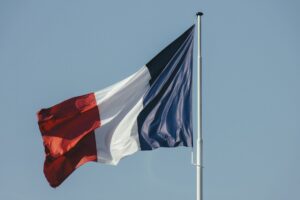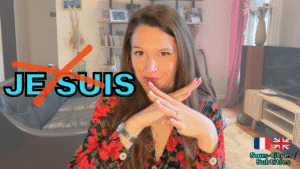In this video, I present 15 French homonyms. These words are pronounced the same, but don't mean the same thing. It's important to be aware of these differences to avoid misunderstandings.
Transcript of the video homonyms in French
Hello everyone, I hope you're all well and that your learning French always goes down very well. Last week, I made a video about 15 French homonyms. I told you I'd be making more, because there are so many words in French that are pronounced the same, but have different meanings and mean different things. In today's video, I bring you 15 more homonyms.
As I said last week, it can be difficult for you to understand discussions and sentences if you don't know that words mean several things. So, first of all, you need to know that these words mean several things, so that you can use the context of the situation to understand them. Before you start, remember to activate the subtitles. This will make it easier for you to understand the video. And above all, it's important because, as I was saying, we're going to talk about words that are pronounced the same way, but not necessarily written the same way, which can be written differently.
To see all my videos, please subscribe to the HelloFrench channel and activate the little bell to be informed when I publish a new video.
The first homonym is paw and paste. For example, I can talk about my cat's paws, so I could say "my dog has hurt his paw, I'm going to take him to the vet", because he's hurt his foot. The other pasta is used either to talk about the pasta we're going to eat, for example, pasta bolognese, pasta carbonara.
So, it's an Italian dish that we're going to eat. There's also pasta, which is spelled the same way, but to refer to a preparation, for example pizza dough or bread dough.
Now let's talk about voice and voice. The first voice is the sound that comes out of my mouth when I speak, so, for example, I might say "Céline Dion has a beautiful voice. She's a great singer".
The other way is a synonym for path. I've taken this route, I've taken that path. You can also use the word voie figuratively to refer to the path. For example, I might say "I chose the path of journalism".
To say that I wanted to be a journalist. Another example might be "you're on the right track to pass your French exam". It means you're on the right track, you're going to pass.
Let's take a look at a homonym that means four different things: green, worm, glass and worm. The first, green, is a color created from yellow and blue. So green is exactly the color I'm wearing.
I might say "I really like green, I'm going to paint my kitchen walls green". Then there's the worm, which is an animal, so it's quite a long animal like that and soft, there's the earthworm. So you find a lot of earthworms in gardens. Then there's the drinking glass. A glass you use to drink water or a glass of wine.
Finally, there's towards, which is a preposition used to indicate direction.
For example, I might say "I live by the harbor" to say that my house is not far from the harbor. Or I could say "I go to the left" to say that you're taking a street that goes to the left. Now let's look at aunt and tent.
Take advantage of these few seconds to subscribe to the channel 🙂
The first aunt is used to refer to your father's or mother's sister. I love my Aunt Marie, I see her every Sunday. The other tent refers to something you use when you go camping. When you go camping, you sleep in a tent. So, it's the shelter we use to sleep. Now let's look at the stain and the task. The first stain is something you do to yourself, for example, on an item of clothing.
If I eat pasta bolognese and spill it on my sweater, I can get a bolognese stain on my sweater.
My sweater's going to get a little color from the bolognese and that's going to be hard to get off. It's going to be messy. The second task is actually a job. For example, I might say "my mother asked me to clean the bathroom, and I did the job in less than two hours". That means this job took me less than two hours. Now let's look at pennies, nickels and dimes. The first penny is for money. For example, I might say "I'm out of money this month, I spent it all on a new purse". That means I've run out of money. The second penny is used to talk about the underside of something.
For example, I might say "my cat is hiding under the table" so he's under the table.
Finally, the third use of the word drunk is to refer to someone or oneself who has had too much to drink.
For example, I might say "Marc was really drunk yesterday, he had five beers". Now let's look at saint, sein and sain. The first saint is used to refer to St. Nicholas, St. Peter and St. Paul. These are figures, people in the Catholic Church whom we decide to sanctify.
In everyday language, we can also say that someone is truly irreproachable, truly upright. You could say "Matthew is a real saint, he's nice to everyone". The second word, sein, is used to refer to a woman's breasts, as in "Patricia breastfeeds her child". The last word, healthy, is used to talk about healthy foods or meals. It's an English word, but we also use it a lot in French. For example, French fries aren't healthy, but a salad is. It's good for your health, good for your body. The next homonym is dirty and salle. I was talking about the word stain earlier in the video. When you get stains on your clothes, you're dirty, so you've made yourself dirty. The adjective dirty means that something isn't clean. The second word, salle, is used to refer to a room or a place, such as a bathroom or a playroom.
In France too, we talk a lot about the salle des fêtes. It's a hall, a place in the village where parties and weddings are held.
Now let's look at roux the adjective and the wheel. So when we use roux as an adjective, it's actually a color that's very close to orange.
The word "red" is generally used to refer to hair color.
For example, I can say "Julia Roberts has red hair, she's a redhead".
Then there's the wheel, which is a round, circular object used for rolling. There's the bicycle wheel and the car wheel.
I could say I had to change my wheel, because the tire was flat. Now let's look at near, ready and ready. Now, the first near is a preposition to say that something isn't far away, that it's close. For example, at the cinema I could say I was sitting next to Jonatan, to say I was close to him. The second loan is when you lend something to someone. You don't give it to them, you lend it to them, so they have to give it back.
For example, if I lend a DVD to a friend, I can tell her "it's a loan, don't forget to give it back to me" to let her know that I'm not giving it to her and that she'll have to return it to me after she's watched it. You can also take out a bank loan. This is when you take out a loan to borrow money to buy an apartment or house, for example. Finally, we use the word loan to say that we're ready, that we're prepared for something.
For example, if I say to someone, "Are you ready?" they might reply, "I've got my coat on, I'm ready, we can go out".
So let's take a look at dans and dent. There's in to say you're in a place, in something. So inside, for example, I might say "I'm in my room" to say that I'm inside my room. In a restaurant, for example, if the waitress asks you "would you like to eat outside or inside?" You can say "it's a bit cold, I'd rather eat inside, in the restaurant and not on the terrace".
Then there's the tooth, which is what's in your mouth. For example, I could say "give me a smile, show me all your teeth". Now let's look at the swan and the sign. The first swan is an animal, a bird. It's a big white bird with an orange beak, often found on ponds or lakes, in parks. For example, I could say "that's a beautiful white swan I see sitting on the lake".
Then there's the sign, like the wave of the hand. It's a gesture you make to signal your presence, to show you're there, or to say hello.
Finally, there's your astrological sign, e.g. Taurus, Scorpio, Virgo. Your astrological sign is linked to your date of birth. Now let's look at fist and point. The first fist is a punch. When you close your hand, in boxing for example, you throw a lot of punches. Then there's the period, for example, which you put at the end of a sentence, the period when you're writing, or the exclamation mark, which is a punctuation mark.
Another use of the word "point" is in sports, where you keep score. In basketball, we keep score. For example, you might say he scored three points. In tennis, too, we keep score. In field hockey, we keep score. Now let's look at court, court and court. What we're doing here is a lesson, a French lesson. So it's a lesson we're following. For example, I could say, "I've been taking a French course for three months, and I'm learning a lot. The second courtyard is an outdoor space where there's no grass, it's often concrete and surrounded by walls or buildings. For example, there's the school courtyard, the space where children go to play during recess, or I could say "when I go into my building, there's a little courtyard". Finally, there's court, which is the opposite of long. For example, I might say "these pants are a bit too short for me", to say that they're too small and don't fit my leg.
The last homonyms we'll look at today are bar, barre and bar. The first bar is a place where you go to have a drink. A synonym is also in French, un café.
It's a place a bit like a restaurant, where you can get together with friends, but you don't usually go out to eat, but rather to have a drink. The second bar is used to refer to something long, usually made of metal, for example, a subway bar, which is something you can stand on so you don't fall off. We can also talk about an iron bar, or, for example, when you're at a funfair in an attraction, you can have a bar in front of you to hold on to so you don't fall. They're also known as cereal bars, because they take up the elongated shape.
Finally, the last sea bass is a variety of fish. It's a very good fish, often grilled. For example, I could say "this lunchtime I ate grilled sea bass with baby vegetables".
That's it for today. I hope you enjoyed this video, especially if you learned anything new. If you did, remember to put a like and, most importantly, subscribe to the channel to see all my videos. See you soon.








